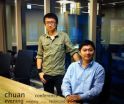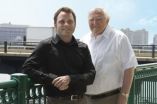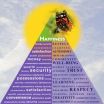American Chemical Society podcast: Tiny generator powers wireless device
2011-06-30
(Press-News.org) WASHINGTON, June 29, 2011 — Imagine a new genre of tiny implantable sensors, airborne and stationary surveillance cameras and sensors and other devices that operate without batteries on energy collected from the motion of a heart beat and have wireless communications capability. And the power plant for those devices is a "nanogenerator" that could even produce energy to charge an iPod from the movements of a person walking down the street.
That's the topic of a new episode in the American Chemical Society's (ACS) award-winning "Global Challenges/Chemistry Solutions" podcast series, which was released today. The podcast features Zhong Lin Wang, Ph.D., of the Georgia Institute of Technology who, described development of the first practical iteration of the device. Wang and colleagues boosted the power output of earlier devices by thousands of times and its voltage by 150 times. Wang reported on the achievement at an ACS National Meeting held in March in Anaheim, Calif.
And the news gets even better. In a development just reported in the ACS journal Nano Letters, Wang and his colleagues also showed for the first time that they could integrate such a nanogenerator into an electronic circuit. It can transmit data wirelessly to an ordinary commercial radio at distances up to 30 feet. The generator can produce electricity using energy from a gentle breeze, movements of a person walking and other sources to power those wireless data transmissions.
"This development represents a milestone toward producing portable electronics that can be powered by body movements without the use of batteries or electrical outlets," Wang says in the podcast. "Our nanogenerators are poised to change lives in the future. Their potential is only limited by one's imagination."
The nanogenerator may find a broad range of other applications that require more power, according to Wang. He lists, for example, personal electronic devices powered by footsteps activating nanogenerators inside the sole of a shoe; implanted insulin pumps powered by a heartbeat; and environmental sensors powered by nanogenerators flapping in the breeze.
INFORMATION:
The new podcast is available without charge at iTunes and from ACS' website at www.acs.org/globalchallenges.
Global Challenges/Chemistry Solutions is a series of podcasts describing some of the 21st Century's most daunting problems, and how cutting-edge research in chemistry matters in the quest for solutions. Global Challenges is the centerpiece in an alliance on sustainability between ACS and the Royal Society of Chemistry. Global Challenges is a sweeping panorama of global challenges that includes dilemmas such as providing a hungry, thirsty world with ample supplies of safe food and clean water; developing alternatives to petroleum to fuel society; preserving the environment and assuring a sustainable future for our children; and improving human health. During the 2011 global celebration of the International Year of Chemistry (IYC), Global Challenges/Chemistry Solutions also is focusing on the main themes of IYC — health, environment, energy, and materials.
The American Chemical Society is a nonprofit organization chartered by the U.S. Congress. With more than 163,000 members, ACS is the world's largest scientific society and a global leader in providing access to chemistry-related research through its multiple databases, peer-reviewed journals and scientific conferences. Its main offices are in Washington, D.C., and Columbus, Ohio.
END
ELSE PRESS RELEASES FROM THIS DATE:
2011-06-30
NEW BRUNSWICK, N.J. – One-third of immigrant children and more than 70 percent of foreign-born, nonelderly adults living in New Jersey five years or less lack health coverage, a Rutgers statewide survey finds.
The report, "Health, Coverage and Access to Care of New Jersey Immigrants," by the Rutgers Center for State Health Policy (CSHP), also concludes immigrants face significant access-to-care barriers and their lack of health insurance is a much larger problem than for New Jerseyans born in the United States.
The research describes the health profile, insurance status ...
2011-06-30
A team of North Carolina State University researchers has discovered more about how a gene connected to the production of new brain cells in adults does its job. Their findings could pave the way to new therapies for brain injury or disease.
Most areas of the brain do not generate new brain cells, or neurons, after we are born. One exception is the olfactory bulb, the brain's scent processor, which continually produces new neurons. Dr. Troy Ghashghaei, assistant professor of neurobiology, had previously found a gene – known as Foxj1–connected to the production of an area ...
2011-06-30
DURHAM, N.C. -- So much for tagging photographs with names, locations and activities yourself – a new cell phone application can take care of that for you.
The system works by taking advantage of the multiple sensors on a mobile phone, as well as those of other mobile phones in the vicinity.
Dubbed TagSense, the new app was developed by students from Duke University and the University of South Carolina (USC) and unveiled at the ninth Association for Computing Machinery's International Conference on Mobile Systems, Applications and Services (MobiSys), being held in ...
2011-06-30
In 2009, the American Society of Civil Engineers (ASCE) assigned the grade "D" to the overall quality of infrastructure in the U.S. and said that ongoing evaluation and maintenance of structures was one of five key areas necessary for improving that grade. Since that time, federal stimulus funds have made it possible for communities to repair some infrastructure, but the field of high-tech, affordable methods for the continual monitoring of structures remains in its infancy. Instead, most evaluation of bridges, dams, schools and other structures is still done by visual ...
2011-06-30
CHESTNUT HILL, MA (June 29, 2011) – American artist Jackson Pollock's paintings often clashed with the rules of the art world. But they couldn't defy the laws of physics, according to a multidisciplinary team of researchers from Boston College and Harvard who give quantitative form to Pollock's methods and genius in the latest edition of the journal Physics Today.
Quantitative analysis is a phrase few would associate with Pollock, the abstract expressionist who during the 1940s and 50s adopted the method of pouring paint onto canvas in order to convey his artistic vision ...
2011-06-30
CHAMPAIGN, Ill. — In 1943, American psychologist Abraham Maslow proposed that all humans seek to fulfill a hierarchy of needs, which he represented with a pyramid. The pyramid's base, which he believed must come first, signified basic needs (for food, sleep and sex, for example). Safety and security came next, in Maslow's view, then love and belonging, then esteem and, finally, at the pyramid's peak, a quality he called
"self-actualization." Maslow wrote that people who have these needs fulfilled should be happier than those who don't.
In a new study, researchers at ...
2011-06-30
WASHINGTON—June 29, 2011—Nearly three-quarters (74%) of Georgia residents think spending money on research to improve health globally is important for economic development in Georgia, according to a new statewide poll commissioned by Research!America.
Eighty-one percent say global health is an issue about which Georgia residents should be concerned, and Georgians place a very high value on their state's leadership in research to improve health here and around the world: 96% say it is important for Georgia to be a leader in health research and development, and 81% say ...
2011-06-30
Palaeontologists have uncovered half-a-billion-year-old fossils demonstrating that primitive animals had excellent vision.
An international team led by scientists from the South Australian Museum and the University of Adelaide found the exquisite fossils, which look like squashed eyes from a recently swatted fly.
This discovery will be published tomorrow (Thursday 30 June 2011) in the prestigious journal Nature.
The lead author is Associate Professor Michael Lee from the South Australian Museum and the University of Adelaide's School of Earth & Environmental Sciences.
Compound ...
2011-06-30
PHILADELPHIA - An estimated 18 American military veterans take their own lives every day -- thousands each year -- and those numbers are steadily increasing. Even after weathering the stresses of military life and the terrors of combat, these soldiers find themselves overwhelmed by the transition back into civilian life. Many have already survived one suicide attempt, but never received the extra help and support they needed, with tragic results. A team of researchers from the Perelman School of Medicine at the University of Pennsylvania and colleagues found that veterans ...
2011-06-30
WASHINGTON — Every year, at least 116 million adult Americans experience chronic pain, a condition that costs the nation between $560 billion and $635 billion annually, says a new report from the Institute of Medicine. Much of this pain is preventable or could be better managed, added the committee that wrote the report.
The committee called for coordinated, national efforts of public and private organizations to create a cultural transformation in how the nation understands and approaches pain management and prevention. Some of the recommended changes can be implemented ...
LAST 30 PRESS RELEASES:
[Press-News.org] American Chemical Society podcast: Tiny generator powers wireless device



